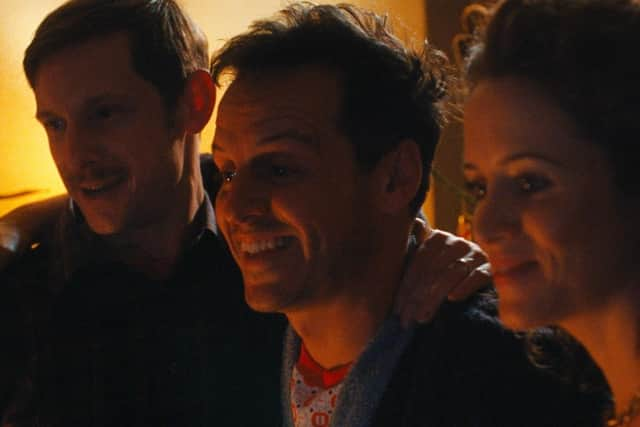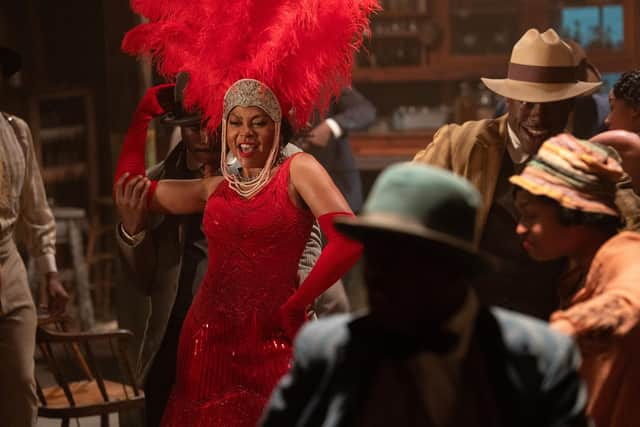Film reviews: All of Us Strangers | The Color Purple
All of Us Strangers (15) *****
The Color Purple (12A) **
In his brilliant new film All of Us Strangers, 45 Years director Andrew Haigh puts an usual spin on explorations of gay identity and family life with a high-concept conceit that initially hints at sci-fi, but turns out to be more of a ghost story about residual grief, one with the emotional kick of something like Truly, Madly, Deeply or Hirokazu Kore-eda’s After Life, but with darker elements that might also put you in mind of Don’t Look Now. Not that those reference points really do an adequate job of summing up what Haigh has accomplished here. Suffice to say, the film’s more fanciful elements are handled with such go-with-the-flow naturalism and confidence that it’s easy to accept the fact that it operates in a kind of dreamy liminal space, one that’s just decipherable enough to feel like you’ve got a handle on the plot, but just ambiguous enough to open up other possible interpretations long after its astonishing final scene plays out.


Said plot revolves around Adam (Andrew Scott), a lonely screenwriter in his late 40s who’s living a limbo-like existence in a block of flats somewhere in present day London. His flat is smart and modern and a little bit airless, and the block itself seems to have been designed to keep the outside world at bay – to the point that it’s mostly unoccupied. Indeed the only other neighbour Adam has seen is Harry, a younger, more emotionally forthright man who knocks on Adam’s door one night and makes a drunken pass that Adam initially rejects (he’s played by Aftersun’s Paul Mescal).
Advertisement
Hide AdLike Harry, Adam is gay, and though fine with it, he’s not so fine around other people, a holdover, perhaps, from the tragic childhood he’s currently trying to write about, a childhood in which he lost his parents in a car crash when he was 12. “Not the most original death,” he admits, the writer in him unable to avoid making self-deprecating quips about the clichés that his own life-story is throwing up.
Haigh, though, is a master of avoiding cliché; instead he uses the notion that all writing is a form of time travel and literalises it by having Adam seemingly resurrect the memory of his parents (gorgeously played by Jamie Bell and Claire Foy) in a way that feels real to him and us. What follows is partly a deft and tender adult coming-of-age story, partly an erotically charged love story, both anchored by the Bafta-snubbed Andrew Scott, who does incredible work putting us in the complicated headspace of Adam as he reckons with the open wound of his own adolescence while also falling for Mescal’s Harry.
Like Haigh’s breakthrough film Weekend, sex and intimacy are depicted realistically here as an everyday part of life, not as something to be tastefully cut away from. The film is all the better for it, not least because its setting and conceit also work as poignant metaphors for the way AIDS and the resulting homophobic backlash against queerness in the 1980s made sex terrifying for a whole generation. But Haigh, loosely adapting a 1987 novel by the recently deceased Japanese writer Taichi Yamada, layers so much meaning and feeling into the film it never once plays like a message movie. Instead it’s a ghost story in the best sense – evocative and haunting.


Another week, another musical redo of a film based on a bestselling book. Alice Walker’s 1983 Pulitzer Prize Winner The Color Purple gets the razzle-dazzle treatment this time and the results are even tamer than Steven Spielberg’s sugar-coated 1985 version. That film was, of course, Spielberg’s first big effort to really stretch himself as a “mature” filmmaker and while it had its plus-points – Oprah Winfrey’s debut performance, Whoopi Goldberg in the lead – he was widely and rightly criticised for shying away from the lesbian relationship at the book’s core, reducing the explicit sexual awakening of Walker’s protagonist Celie to a single tasteful kiss.
To his credit, Spielberg later admitted he was too embarrassed to fully go where Walker had gone, but said he might have been more daring had he made the film ten years later. Nearly four decades on, though, another pair of male filmmakers, director Blitz Bazawule and screenwriter Marcus Gardley, have taken both Walker’s novel and Spielberg’s adaptation and sanitised the story even further, making the sexualised text subtext via coyly codified homages to the art deco-inflected musicals of the genre’s Golden Age.
To be fair, Walker’s epistolary novel is an odd source for a musical given it deals with incest, child molestation, rape, domestic abuse, patriarchal oppression and systemic and explicit racism. But while there’s a case to be made for using blues and jazz to transform those themes into female self-empowerment showstoppers, the filmmakers’ collective determination to sideline Walker’s intimate exploration of female sexuality in favour of the literal and figurative tale of sisterhood that’s also part of the book is a real failure of nerve. Next to All of Us Strangers, this is like a film from 1944 not 2024.
Advertisement
Hide AdAs with Spielberg’s version, the performances are the film’s saving grace: Fantasia Barrino as the put-upon heroine Celie, Taraji P Henson as the object of her affections Shug Avery, the Oscar-nominated Danielle Brooks as the no-nonsense wife of Celie’s stepson, and Colman Domingo as Celie’s abusive husband Mister all help bring aspects of Walker’s radical novel to life in spite of the film’s overall timidity. Maybe in another 40 years Walker’s book will get the adaptation it deserves.
Both films are on general release from 26 January.